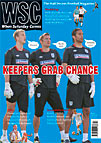 Although they both have grounds on the same street, the fortunes of Dundee and Dundee United have contrasted sharply in recent seasons. Neil Forsyth looks at a remarkable few months on Tayside.
Although they both have grounds on the same street, the fortunes of Dundee and Dundee United have contrasted sharply in recent seasons. Neil Forsyth looks at a remarkable few months on Tayside.
In any two-team city a football club’s perceived success is measured in two ways – their success and the comparative success of the other. For the city of Dundee that delicate arrangement has just encountered a volatile season.
Dundee and Dundee United famously have grounds on the same street, the closest league clubs in Britain, and though they may be a division apart there’s an intensity to the rivalry in a city of 140,000 people and local media with daily space to fill. In January the sports pages predicted that the established football seniority was ready for a shift.
It was Dundee who were very much on the up. Eleven points clear at the top of the First Division, 15 points clear of Inverness Caledonian Thistle (relegated from the SPL the year before and expected to be Dundee’s promotion challenger), boosted by a millionaire backer and managed by the loyal Jocky Scott who was back at the club after being sacked twice before.
Meanwhile, United were badly disjointed by manager Craig Levein departing for the Scotland job. His assistant Peter Houston took temporary charge while United tried and failed to hire a replacement. Stuttering form reached a nadir with a 7-1 defeat to Rangers after which Houston told anyone left listening that he would not be looking for the job.
Dundee, it seemed, were bound for the SPL and there they’d find a weakened United who have openly stated that, like the entire SPL, their finances are decidedly precarious. For Dundee fans that prospect provoked delirium. The last period they held sustained superiority over their rivals was the 1960s. United enjoyed domestic and European success in the 1980s, shaded the 1990s with their 1994 Scottish Cup win and the 2000s were marked by Dundee’s 2005 relegation and resulting half decade in the First Division.
Relegation followed a period of collective madness at Dundee’s Dens Park. Scott was sacked (for the second time) in 2000 after leading the club to fifth place in the SPL. Dundee then embarked on a bizarre speculate-to-accumulate policy which saw Claudio Caniggia and Fabrizio Ravanelli among players attracted by the club’s largesse. The result was no finish higher than sixth, administration, financial meltdown and relegation.
Of all the fantastical figures used to retrospectively demonstrate British football’s financial idiocy of recent times there cannot be many more ludicrous than these – when Dundee limped into administration in 2003 their debt was £23 million and their average home gate around 6,000.
Admirable work by fans group Dee4Life helped save Dundee and despite losing ownership of Dens Park the club achieved near self-sufficiency. This changed last summer with the arrival of multi-millionaire businessman Calum Melville. Melville swelled the playing budget and offered bullish statements including “second is nowhere”.
The wary among Dundee’s support were assuaged by that impressive start to the season that saw them sitting so comfortably in January. But it was the most false dawn imaginable. A collapse in form saw Scott sacked for a third time with Dundee three points clear at the top and a desperate end to the season let Inverness CT ease to the title while Dundee descended into bitter introspection.
On the contrary, United enjoyed a remarkable five months. Houston not only gained the manager’s job, he led the club to a commanding third-place finish and steered them past Rangers en route to the Scottish Cup final. A dominant victory over Ross County won the Scottish Cup for only the second time in 100 years. Dundee supporters drew their curtains as the city was overtaken by celebrations.
For United, the Cup win and likely sale of at least one young star will more than balance the books. For Dundee, Melville insists he will continue to invest in the short-term but the club have reduced the playing budget.
As a Dundonian and United fan, I’m not alone in hoping Dundee win promotion. One of the many joys of the Cup final weekend were reports of Dundee-supporting acquaintances slipping away for sudden weekend breaks. But Dundee’s intercity rivalry has a different edge to the other prominent city rivalries in Scotland – Edinburgh and, God forbid, Glasgow.
The Dundee derby is one of Scottish football’s jewels and has been missing from the calendar for six years. Culturally and politically Dundee often appears Scotland’s forgotten city. It must be hoped the meeting of Dundee’s two clubs doesn’t become the country’s forgotten derby.
From WSC 281 July 2010